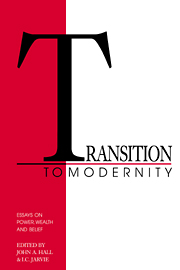Book contents
- Frontmatter
- Contents
- List of illustrations
- List of contributors
- Introduction
- PART I THE PRE-MODERN WORLD
- 1 World languages and human dispersals: a minimalist view
- 2 Nomads and oases in Central Asia
- 3 Why poverty was inevitable in traditional societies
- PART II TRANSITIONS TO THE MODERN WORLD
- PART III MODERNITY AND ITS DISCONTENTS
- Indexes
1 - World languages and human dispersals: a minimalist view
Published online by Cambridge University Press: 02 February 2010
- Frontmatter
- Contents
- List of illustrations
- List of contributors
- Introduction
- PART I THE PRE-MODERN WORLD
- 1 World languages and human dispersals: a minimalist view
- 2 Nomads and oases in Central Asia
- 3 Why poverty was inevitable in traditional societies
- PART II TRANSITIONS TO THE MODERN WORLD
- PART III MODERNITY AND ITS DISCONTENTS
- Indexes
Summary
Entia non sunt multiplicanda praeter necessitatem
William of Occam‘Don't be afraid to be wrong’, Sir Mortimer Wheeler once wrote to me encouragingly. When one thinks of Ernest Gellner it is of intellectual audacity, tempered however with toughmindedness and refreshing and often self-critical wit. He certainly lives up to Wheeler's maxim – which is not, for a moment, to suggest that he is indeed wrong with any frequency. To be asked to contribute to a Festschrift in his honour seemed to me a daunting task. But my initial faltering wish to contribute was strengthened when my reading in the rather hazy overlap area between the fields of archaeology and language brought me to glimpse the possibility of an emerging synthesis on a grand scale, important if right, – but not yet securely documented and therefore to be judged ‘premature’ among sound (conservative) academics1. If upheld it would offer a strikingly simple view of the origins of linguistic diversity, and one conforming satisfyingly with that stern injunction, the razor, of William of Occam. It is a pleasure, however, to offer this ‘wild surmise’ in admiration to a scholar who seeks to perceive the broad perspective and who will respond first to any originality, and only later gently point out the objections.
To do so is doubly appropriate, in view of Ernest Gellner's generous response to my book Archaeology and Language, itself not without critics. I well member a very agreeable evening with Ernest and Susan at 9 Clarendon Street, after a seminar where the distinguished Soviet (now Israeli) scholar A.M. Khazanov had been discussing ethnicity.
- Type
- Chapter
- Information
- Transition to ModernityEssays on Power, Wealth and Belief, pp. 11 - 68Publisher: Cambridge University PressPrint publication year: 1992
- 17
- Cited by



